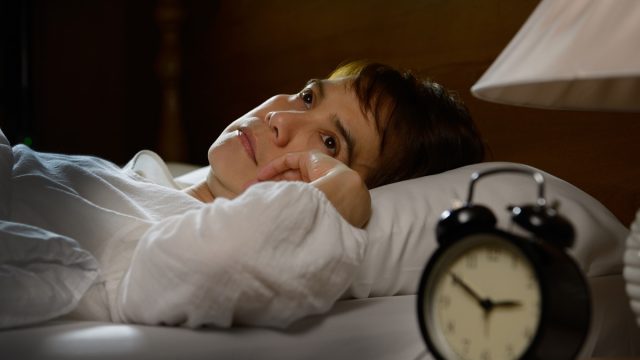Why It’s So Much Harder to Sleep in Winter—And How to Fix It

Many of us sleep soundly through the summer nights, especially with the AC going. But once the weather grows colder, we suddenly start finding ourselves lying in bed wide awake, and strangely unable to drift off. If you’re struggling to fall asleep and stay asleep more than usual lately, you’re hardly alone. The winter season has been known to lead to insomnia and sleepless nights. And knowing why that is may help you get more rest during the colder nights.
RELATED: Sleep Expert Reveals How to Instantly Warm Your Bed This Winter.
One of the main reasons why you might find it harder to sleep right now is due to the shorter days, according to Julia Siemen, a certified sleep science coach at Sleep Advisor.
“In winter, shorter daylight hours and reduced sunlight exposure can disrupt the body’s natural sleep cycle,” she says.
The lack of sunlight can specifically affect melatonin, which is an important hormone in your body that helps regulate your circadian rhythm and sleep-wake cycle.
“Less morning light can lead to less suppression of melatonin, making it harder to feel fully awake during the day,” Siemen explains. “Earlier sunsets mean a less dramatic decrease in melatonin levels at bedtime, affecting the quality of sleep.”
Jade Wu, PhD, a clinical psychologist and board-certified behavioral sleep specialist, tells Best Life that in order to achieve “optimal circadian functioning” there needs to be a large contrast with how much light we’re exposed to during the day compared to the night.
“This means we should really try to get outdoors whenever we can during the day, and to minimize bright screens in the evenings,” Wu advises. “This is always helpful, but especially important in winter when our circadian clocks need a boost.”
RELATED: 6 Reasons You Feel Tired But Can’t Fall Asleep, According to Doctors.
It’s not just the diminished sunlight exposure in the winter that may be making it harder for you to sleep, however. Michael Breus, PhD, founder of The Sleep Doctor, says the change in seasons can also cause people to shift their bedroom temperature to one that is too cold or too warm.
“Remember, temperature plays a crucial role in sleep,” he points out.
Research indicates that the optimal sleep temperature for most people is around 68 to 72 degrees Fahrenheit, according to Breus. But in the winter, he finds that many people end up sleeping in environments that are much warmer than that because they’re trying to combat the colder weather outside.
“Loading up on blankets and warm pajamas can easily lead to an overheated sleep space, and trouble falling and staying asleep,” he shares. “Our bodies are biologically wired to lower core body temperature as part of moving toward sleep. Keeping things too warm can interfere with that important drop in body temperature, and keep you awake. A warm bedroom may also impede melatonin production, contributing to insomnia.”
Breus recommends staying warm at night during the winter, but not too warm.
“Be sure to dress yourself and your bedding in natural, breathable fabrics that allow heat to circulate and dissipate, so you don’t overheat from trying to keep yourself from being too cold,” he says.
On the other end of the spectrum, our bodies also shed the most heat through extremities, and Breus says that cold feet end up being one of the most common reasons why people wake up during the night in the winter. So he also suggests “dedicating some warm socks for sleeping if you’re prone to having chilly toes at night.”
RELATED: New Study Reveals the Best Bedroom Temperature for Perfect Sleep.
Alongside these two major issues, some of the other problems that may affect your ability to sleep in the winter include dry air, the holidays, and a lack of exercise, according to Sanam Hafeez, PsyD, a NYC-based neuropsychologist and director of Comprehend the Mind.
In the winter, the air tends to be drier, and this can lead to respiratory issues such as nasal congestion and dry throat. “Breathing difficulties can interrupt sleep, making it harder to stay asleep through the night,” Hafeez explains.
Our routines also often change during the winter season because it coincides with the holidays. This can result in “holiday stress, irregular schedules, and increased social activities that disrupt normal sleep patterns,” Hafeez cautions. On top of that, cold weather may affect our workout routines as well.
“Regular exercise promotes better sleep, and a decrease in physical activity during winter can contribute to sleep difficulties,” he adds.
That means making sure you let yourself de-stress from the holidays and also keep yourself active could make a huge difference to your ability to fall asleep and stay asleep—this month and beyond.
For more sleep advice delivered straight to your inbox, sign up for our daily newsletter.